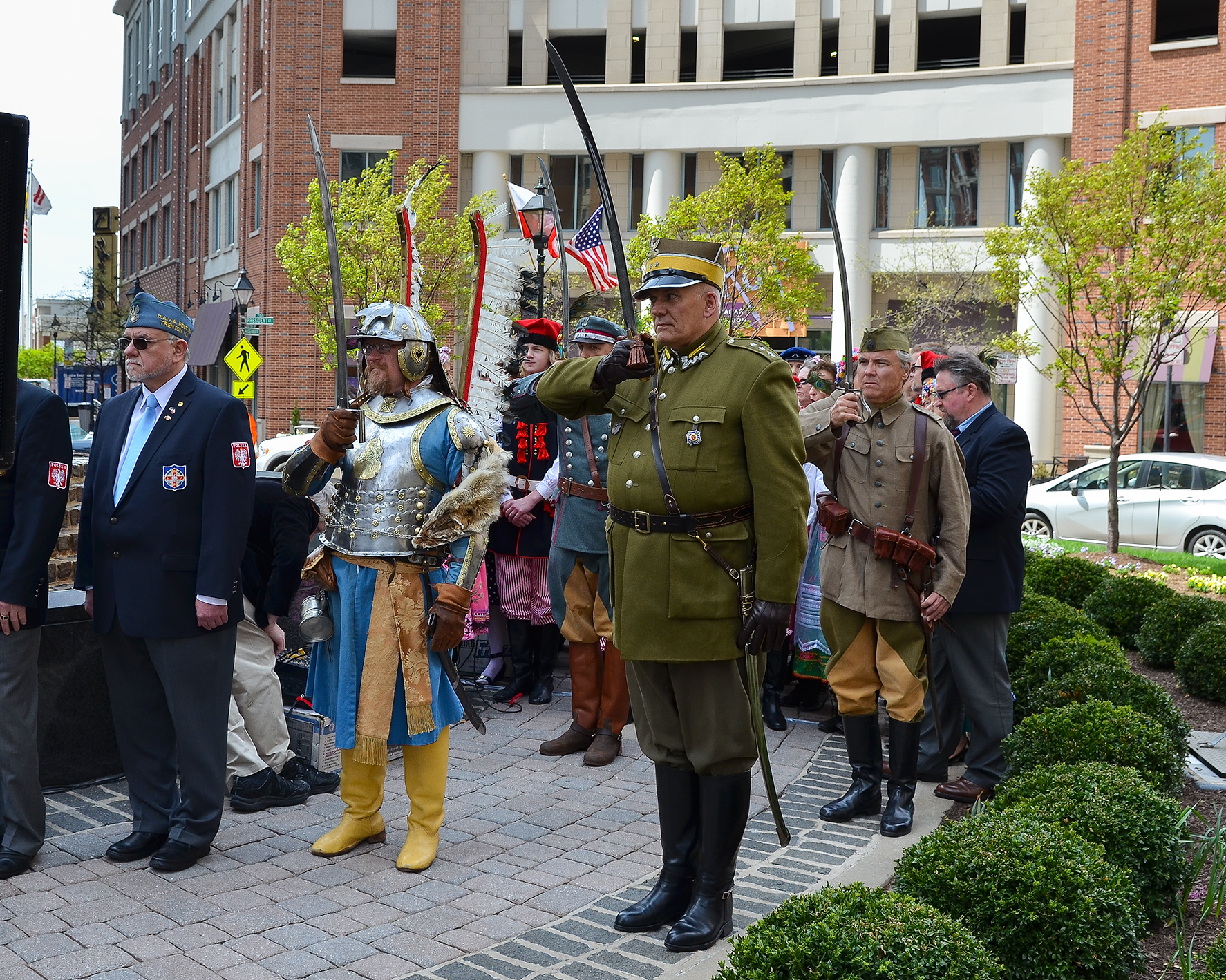18th Remembrance of the Katyń Martyrs
At the National Katyń Memorial. Shown at the opening ceremonies of the 18th Annual Katyń Remembrance in Baltimore are, from left, Colonel Michal Sprengel and Minister/Counselor Piotr Erenfeicht – both representing the Embassy of the Republic Poland, MC Thomas Rybczynski and Chairman Richard Poremski – both NKMF officers, and Fr. Ryszard Czerniak – Holy Rosary Church, all assembled in front of the National Katyń Memorial.
By Richard Poremski, Washington, DC Bureau
Polish American Journal
May 9, 2018
BALTIMORE, Md. – They Came to Remember. It was hoped to be a typical spring day but the uncooperative weather was cool, windy, and topped with an overcast sky - but still over 150 people assembled here anyway on Sunday, April 29, 2018. They all came to memorialize the 22,000 Polish military officers, including many of Poland’s officialdom, leading citizens and intelligentsia that were murdered during the infamous March/April 1940 Katyń Forest Massacre at the bloodied hands of the Soviet Union’s (aka Russian) militarized political police (NKVD). Besides Katyń, this all-encompassing stark genocide was also carried out at other such horrid locations such as Mednoe, Kharkov, Starobelsk and Ostashkov during the early Word War II time frame.
The 18th Annual Katyń Remembrance was organized by the National Katyń Memorial Foundation (NKMF) in cooperation with the Embassy of the Republic of Poland. The ceremonies included color guards, Christian and Jewish clergy, diplomats, guest speakers, politicians, military officers, folk groups, wreaths laying, and “Taps” by a Maryland National Guard bugler.
Follows is the selected remarks of the featured speakers:
Secretary of State John C. Wobensmith, representing Maryland Governor Lawrence “Larry” Hogan: “Katyń is an important part of history never to be forgotten.” The Secretary briefly recounted the sad history of Katyń, the suppression of its truth, and mentioned how the Katyń Memorial was eventually raised in Baltimore. He also complimented the Baltimore Polish community for its strength and unity in doing so. “We must give the victims the dignity they deserve,” Wobensmith continued, “and we are very fortunate to have the Katyń Memorial here in Baltimore 4,000 miles away from Poland, and a place we can all gather together and say ‘never again.”
Governor Hogan was then ceremoniously inducted into the National Katyń Memorial Foundation as an Honorary Member by its Chairman Richard P. Poremski. Secretary Wobensmith proudly accepted the framed certificate and Katyń armband on behalf of the Governor.
Colonel Michal Sprengel – Deputy Defense and Military Attache, representing Brigadier General Cezary Wisniewski - Defense, Military, Naval and Air Attache, Embassy of the Republic of Poland: “Today we commemorate the sacrifice of the Polish soldiers brutally murdered during the Katyń Massacre by the Soviets.”
“We will never forget about them.”
“We will never forget about their fight for a free and independent Poland.”
“We will never forget the words of their military oath – ‘In time of need I will dedicate my blood and life for my homeland and countrymen, so help me God.’”
“They are our heroes and they live forever.”
Minister/Counselor Piotr Erenfeicht – Head of the Political Section, read the remarks of Ambassador Piotr Wilczek, Embassy of the Republic of Poland, who was unable to attend: “The Katyń Massacre was more than just the murder of 22,000 prisoners of war by the Soviet NKVD. It was the planned elimination of Poland’s leadership and to ensure that the Polish nation would never rise again. The victims came from different regions, professions, different faiths, and different upbringings. But they were united in their love and dedication to Poland. They were officers called-up to act in time of peril. They were singled out for slaughter based on their social background.”
“This was the first generation who experienced a free Poland after more than 100 years of its partitioned non-existence. Their oppressors thought by killing them they would weaken the social fabric of the Polish nation. Oh… but they were so wrong! A free and independent Poland was for times suppressed – but it never died – it lived on in the minds of the people.”
“In Poland the Soviets suppressed all mention of Katyń. In the Empire of Lies the truth was treason. Our presence here today is a testament to the truth. We stand here before this eternal monument dedicated to Katyń and to all who dedicated their lives for the fight for truth. We will never forget them.”
Earlier in the day, a Katyń dedicated Mass was celebrated at Holy Rosary Church in Polish and English. At the afternoon reception and dinner in the Great Hall of the Polish National Alliance the 96 victims of the April 10, 2010 catastrophic Smolensk-Katyń airplane crash were honored in a candle-lighting ceremony. It claimed the lives of Poland’s President Lech Kaczynski, his wife Maria, the Chiefs of the Armed Forces, esteemed clergy, prominent government officials, eminent members of the parliament, notable institutional leaders and honored citizens. They were flying to the Katyń Forest to pay homage to the slain sons of Poland.
On this reflective spring Sunday all who perished because of Katyń were commemorated… those in April 1940 by the hand of Josef Stalin’s Soviet Union… and more recently those by the capricious Hand of Fate on April 10, 2010. ❑


